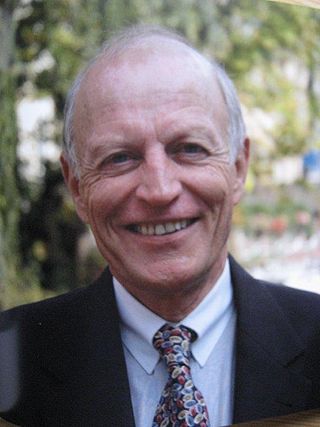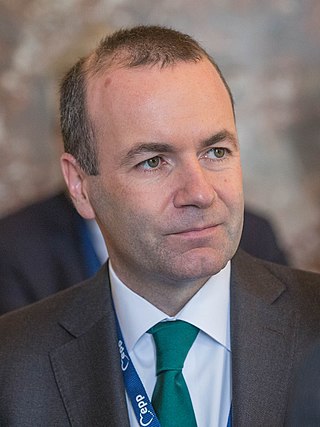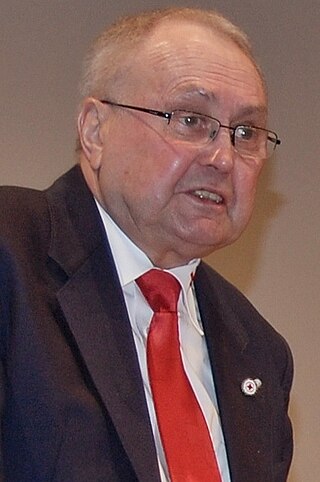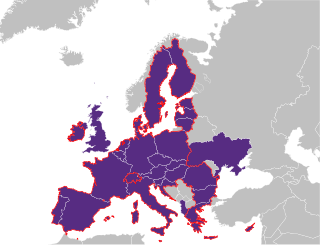
An EU Battlegroup is a military unit adhering to the Common Security and Defence Policy (CSDP) of the European Union (EU). Often based on contributions from a coalition of member states, each of the eighteen Battlegroups consists of a battalion-sized force reinforced with combat support elements. Two of the battlegroups were to be capable for operational deployment at any one time. The civil power that oversees these battlegroups is the Council of the European Union.

Godelieve Quisthoudt-Rowohl is a German politician who served as a Member of the European Parliament from 1989 until 2019. She is a member of the Christian Democratic Union in Lower Saxony, which is a part of the European People's Party. She most recently served as the European People's Party's coordinator of the International Trade Committee (INTA), chairwoman of the UK Monitoring Group of INTA, vice-coordinator of the Committee on Human Rights (DROI) and vice-chairwoman of the Delegation for relations with Canada.

Ursula Gertrud von der Leyen is a German physician and politician serving as the 13th president of the European Commission since 2019. She served in the German federal government between 2005 and 2019, holding successive positions in Angela Merkel's cabinet, most recently as federal minister of defence. Von der Leyen is a member of the centre-right Christian Democratic Union (CDU) and its EU affiliated group, the European People's Party (EPP).
The Military Counterintelligence Service is one of the three federal intelligence agencies in Germany, and is responsible for military counterintelligence within Bundeswehr. The MAD is subordinate to the Federal Ministry of Defense.

The Helsinki Headline Goal was a military capability target set for 2003 during the December 1999 Helsinki European Council meeting with the aim of developing a future European Rapid Reaction Force. There was much interest in the idea of a single EU military force, and inexact characterisations of the initiative led to imprecise journalistic depictions about a unified European army.

The German Institute for International and Security Affairs is a German think tank in international relations and security studies. A semi-official organization with close links to the federal government, it advises the Bundestag and the federal government on foreign and security policy issues, and also advises decision-makers in international organisations relevant to Germany, above all the European Union, NATO and the United Nations. SWP is regarded as one of Europe's most influential think tanks in international relations. It is headquartered in Berlin and incorporated as a foundation.

The far-right in Germany slowly reorganised itself after the fall of Nazi Germany and the dissolution of the Nazi Party in 1945. Denazification was carried out in Germany from 1945 to 1949 by the Allied forces of World War II, with an attempt of eliminating Nazism from the country. However, various far-right parties emerged in the post-war period, with varying success. Most parties only lasted a few years before either dissolving or being banned, and explicitly far-right parties have never gained seats in the Bundestag post-WWII.

Karl-Theodor Maria Nikolaus Johann Jacob Philipp Franz Joseph Sylvester Buhl-Freiherr von und zu Guttenberg, known professionally as Karl-Theodor zu Guttenberg, is a German businessman and politician of the Christian Social Union (CSU). He served as a member of the Bundestag from 2002 to 2011, as Secretary-General of the CSU from 2008 to 2009, as Federal Minister for Economics and Technology in 2009 and as Federal Minister of Defence from 2009 to 2011.

Dieter Mahncke is a scholar of foreign policy and security studies, and Alfried Krupp von Bohlen und Halbach Professor Emeritus of European Foreign Policy and Security Studies at the College of Europe. He is the author of books and articles on European security, arms control, German foreign policy, Berlin, US-European relations and South Africa.

The 2019 European Parliament election was held between 23 and 26 May 2019, the ninth parliamentary election since the first direct elections in 1979. A total of 751 Members of the European Parliament (MEPs) represent more than 512 million people from 28 member states. In February 2018, the European Parliament had voted to decrease the number of MEPs from 751 to 705 if the United Kingdom were to withdraw from the European Union on 29 March 2019. However, the United Kingdom participated alongside other EU member states after an extension of Article 50 to 31 October 2019; therefore, the allocation of seats between the member states and the total number of seats remained as it had been in 2014. The Ninth European Parliament had its first plenary session on 2 July 2019.

This article outlines the history of the Common Security and Defence Policy (CSDP) of the European Union (EU), a part of the Common Foreign and Security Policy (CFSP).

This article outlines the defence forces of the European Union (EU), which implement the EU's Common Security and Defence Policy (CSDP) in CSDP missions. There are two categories of EU multinational forces: ones that have been established intergovernmentally and made available to the CSDP through article 42.3 of the Treaty on European Union (TEU), such as the Eurocorps; and the EU Battlegroups, established at the EU level.
Sven Simon is a German law professor and politician who has been serving as a Member of the European Parliament since 2019. He previously taught international and European law at Philipps University of Marburg. In the 2019 European Parliament election he was the lead candidate for the Christian Democratic Union Hessen.

Dr. Eckart Conze is a German historian, author, and professor of modern history at the University of Marburg in Hesse.

Rüdiger Proske was a prolific German author on politics and current affairs, a television journalist and a social democratic trades unionist. In 1961 he was a co-founder of the NDR current affairs programme Panorama.

The Linienstraße is a street in Dortmund, Germany, known for prostitution. The street is located north of the city's main railway station Dortmund Hauptbahnhof in the Stadtbezirk Innenstadt-Nord district. There have been brothels on Linienstraße since the beginning of the 20th century. Under the "Sperrbezirk" regulations, prostitution in central Dortmund is only permitted in Linienstraße.

Eduard Lintner is a German politician and lobbyist. From 1991 to 1998, he was Parliamentary State Secretary for the Federal Secretary of the Interior and from 1992 to 1998 he was the Drug Enforcement Officer in the Federal Government.

Volt Germany is a social-liberal pro-European, eurofederalist political party in Germany. It is the German branch of Volt Europa, a political movement that operates on a European level.
The Strategic Compass for Security and Defence is a roadmap document written by the European External Action Service in 2022. and adopted on 25 May 2022 by the European Council. Josep Borrell, the foreign policy chief at the time, said that it was a "turning point for the European Union as a security provider and an important step for the European security and defence policy." He also said that given the 2022 Russian invasion of Ukraine, a "sea change in EU security and defence" was necessary. The document is seen as a parallel to the National Security Strategy of the United States. It was the first time a collective threat assessment procedure was written. A lengthy list of deliverables included the birth of the Rapid Deployment Capacity, by 2025. Its intended reach was global. A lecturer thought that "Russia has unleashed the strongest push to strengthen Europe’s defence since the end of the Cold War", and that this document provided the necessary impetus.














